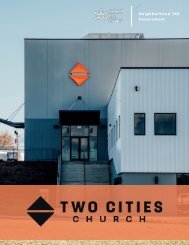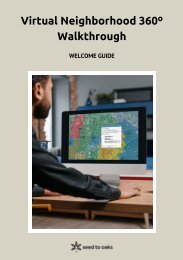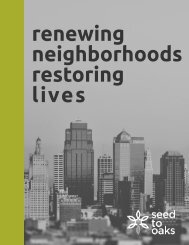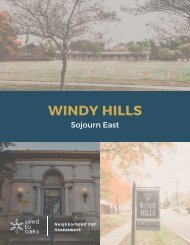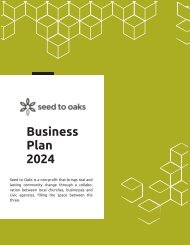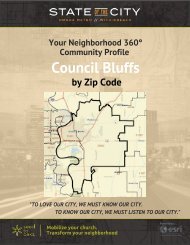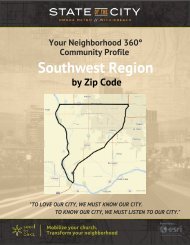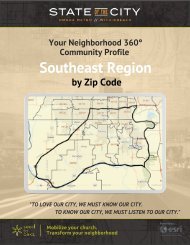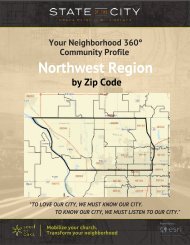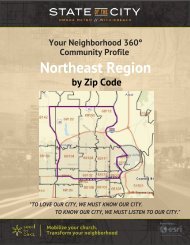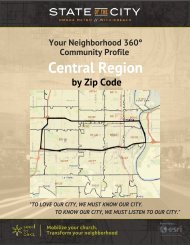Valley Creek Baptist Church South Wilson Campus
Valley Creek Baptist Church - South Wilson Road Campus in Elizabethtown, KY
Valley Creek Baptist Church - South Wilson Road Campus in Elizabethtown, KY
Create successful ePaper yourself
Turn your PDF publications into a flip-book with our unique Google optimized e-Paper software.
Neighborhood 360º<br />
Assessment<br />
<strong>South</strong> <strong>Wilson</strong> <strong>Campus</strong>
WELCOME TO YOUR<br />
NEIGHBORHOOD 360º ASSESSMENT<br />
Introduction<br />
Neighborhood Snapshot<br />
<strong>South</strong> <strong>Wilson</strong> <strong>Campus</strong> Origin Story<br />
History of Elizabethtown<br />
Local Insights<br />
Demographics<br />
Neighborhood Observations<br />
Survey Results<br />
<strong>Church</strong>es and Spiritual Life<br />
Opportunities for Ministry<br />
Reflective Questions<br />
2<br />
<br />
3<br />
<br />
4<br />
<br />
4<br />
<br />
5<br />
<br />
6<br />
<br />
7<br />
<br />
9<br />
<br />
10<br />
<br />
10<br />
<br />
11
INTRODUCTION<br />
<strong>Valley</strong> <strong>Creek</strong> <strong>Baptist</strong> <strong>Church</strong> is a mission driven<br />
church who exists to grow the kingdom of God<br />
and build up new and young disciples for Christ.<br />
We believe that the world is our mission field<br />
and strive to live everyday with that as a driving<br />
force of everything we do. Inside the church, we<br />
work to make disciples who are readily<br />
equipped to share the gospel and are<br />
comfortable doing so in any situation.<br />
To better understand Elizabethtown and the<br />
current barriers and bridges that exist, we<br />
commissioned a team of volunteers to conduct<br />
an in-depth neighborhood study of the<br />
neighborhoods surrounding <strong>Valley</strong> <strong>Creek</strong> <strong>Baptist</strong><br />
<strong>Church</strong>. Our goal was to become students of<br />
Elizabethtown in order to become servants of<br />
the community. We surveyed neighbors door-todoor,<br />
conducted in-depth interviews, spent<br />
hours walking to observe our streets, and<br />
collected demographic, historical and cultural<br />
data to complete this study.<br />
This neighborhood study is intended to aid you,<br />
your ministry team, your Life Groups, and our<br />
church body to:<br />
Build connections between <strong>Valley</strong> <strong>Creek</strong> <strong>Baptist</strong><br />
<strong>Church</strong> and the community<br />
Guide strategic planning and the development<br />
of new ministries<br />
Draw on stories of motivation and vision in the<br />
community<br />
Understand the forces that affect the lives of<br />
people in the community<br />
Understand the community factors that will<br />
influence ministry effectiveness<br />
Understand how we as a church are affected by<br />
the community<br />
Discern how <strong>Valley</strong> <strong>Creek</strong> <strong>Baptist</strong> <strong>Church</strong> is<br />
perceived by the community<br />
Engage our neighbors through creative,<br />
effective, and wise relationships<br />
At the end of this booklet, you will find a series of<br />
discussion questions. Our goal is not to prescribe<br />
ministry opportunities to all of our members and<br />
Life Groups but to provide this study as a means of<br />
stimulating creative thinking. So, once you’ve read<br />
through this study, gather a few friends and discuss<br />
how your group or ministry can wisely and<br />
effectively engage the people of Elizabethtown.<br />
We are excited to see what God will do through our<br />
presence in Elizabethtown!<br />
2
NEIGHBORHOOD SNAPSHOT<br />
<strong>Valley</strong> <strong>Creek</strong> <strong>Baptist</strong> <strong>Church</strong>’s <strong>South</strong> <strong>Wilson</strong> campus is<br />
located on <strong>South</strong> <strong>Wilson</strong> road near one of the busiest<br />
areas of Elizabethtown. Our Neighborhood 360<br />
Assessment focused on an area that fell within an<br />
approximate 1 ½ mile radius from the campus. More<br />
specifically, the focus area was established using the<br />
following natural boundaries: Patriot Parkway to the<br />
west, Rineyville-Big Springs Road to the north, Bewley<br />
Hollow Road to the east, and Robinbrooke<br />
Boulevard/Pear Hollow Road to the south.<br />
Already one of the more densely populated areas in<br />
Hardin County, the area surrounding the <strong>South</strong> <strong>Wilson</strong><br />
campus is poised to become increasingly populated in<br />
the coming years due to the projected growth<br />
accompanying multiple industries moving into<br />
Elizabethtown and the surrounding areas. In the<br />
summer of 2022, the City of Elizabethtown annexed<br />
dozens of acres immediately surrounding the <strong>South</strong><br />
<strong>Wilson</strong> campus, rezoning the annexed property for<br />
high-density residential housing.<br />
3
SOUTH WILSON CAMPUS ORIGIN STORY<br />
Founded in 1872, <strong>Valley</strong> <strong>Creek</strong> <strong>Baptist</strong> <strong>Church</strong> has been a faithful presence in Elizabethtown for over 150<br />
years. What began as a gathering of 25 constituting members meeting under an apple tree grew to a<br />
gathering of several hundred people in attendance each Sunday.<br />
Over the years, multiple construction and renovation projects were undertaken to accommodate a growing<br />
congregation. As adequate space continued to be an issue, VCBC leadership began to consider the<br />
possibility of expanding to a second location. As they focused on potential locations for a second campus,<br />
one property quickly rose to the top – a 30,000+ square foot facility sitting on 3+ acres of land located<br />
approximately 15-20 minutes northwest of the main campus.<br />
HISTORY OF ELIZABETHTOWN<br />
Elizabethtown, Kentucky is a city in Hardin County, situated in the central part of the state. It was<br />
established in 1793 and named after Elizabeth Hynes, the wife of Colonel Andrew Hynes, who was a<br />
settler in the area. The land where Elizabethtown was founded was originally part of a large parcel of<br />
land granted by the state of Virginia to the Marquis de Lafayette in recognition of his service during the<br />
American Revolution.<br />
In the early days of Elizabethtown, it was a small trading center for local farmers, and the town grew<br />
slowly. However, the establishment of a post office in 1800 helped to increase its importance as a<br />
commercial hub. The town's location on the Louisville and Nashville Turnpike also made it an important<br />
stop for travelers heading west.<br />
During the Civil War, Elizabethtown played a strategic role due to its location on the major roads leading<br />
to both Nashville and Louisville. In 1862, Confederate General Braxton Bragg and his troops occupied the<br />
city for a short time, using it as a base of operations during their invasion of Kentucky. Union troops<br />
eventually retook the city, and it was not until the end of the war that the town fully recovered.<br />
Throughout the 20th century, Elizabethtown continued to grow and prosper. The establishment of Fort<br />
Knox, a large military base nearby, brought many jobs to the area and helped to spur development.<br />
Today, Elizabethtown is a thriving community. Its location along Interstate 65 makes it a popular stop for<br />
travelers, and the city is home to a number of businesses and industries, including healthcare,<br />
manufacturing, and education. There are also many cultural and recreational opportunities in the area,<br />
including the summer concert series at Freeman Lake Park, organized sports, and the Heartland Festival.<br />
The City Seal, with the inscription "Elizabethtown, Strong and Growing Since 1779" still rings true today.<br />
4
LOCAL INSIGHTS<br />
Elizabethtown (or Etown/E-town/E’town as the locals call it) has something to offer for everyone,<br />
whether you are doing business, visiting or living here. While the City of Elizabethtown has a population<br />
of over 31,000 residents, we discovered that the average daytime population doubles due to the<br />
regional attraction as a place to work, shop, dine and entertain. It’s a great place to live. Elizabethtown<br />
is a diverse community with annual festivals, award-winning schools and a thriving historic downtown.<br />
Elizabethtown, aptly nicknamed “Hub City,” is situated at the crossroads of several major thoroughfares<br />
– (I-65, Western Kentucky Parkway, and Bluegrass Parkway). On a broader scale, Elizabethtown is<br />
centrally located just a few hours drive (or less) from several major U.S. cities, including Louisville,<br />
Indianapolis, Nashville, and St. Louis.<br />
Additionally, due to its close proximity to Fort Knox, Elizabethtown is home to military families and<br />
individuals from a variety of backgrounds, which contributes to a community that is increasingly diverse<br />
across a variety of spectrums.<br />
5
DEMOGRAPHICS<br />
POPULATION HIGHLIGHTS<br />
Total Population: 31,298<br />
Total Households: 13,296<br />
AGE<br />
65+: 12%<br />
40-64: 33%<br />
22-39: 24%<br />
18-21: 5%<br />
0-17: 25%<br />
RACE<br />
White 25,038 (80.4%)<br />
Black: 3,393 (11.2%)<br />
Asian: 757 (2.5%)<br />
Hispanic: 1,665 (5.5%)<br />
Other: 123 (0.4%)<br />
GENDER<br />
Female: 50.6%<br />
Male: 49.4%<br />
EDUCATION<br />
Higher Degree: 28.7%<br />
High School: 91.3%<br />
MEDIAN HOUSEHOLD INCOME<br />
Elizabethtown: $57,163<br />
Kentucky: $52,295<br />
EMPLOYMENT<br />
Employed: 54.9%<br />
Unemployed: 4.7%<br />
Not in the Labor Force: 36%<br />
MARITAL STATUS<br />
Never Married: males 30%, females 22%<br />
Married: males 54%, females 52%<br />
Separated/Divorced: males 14%, females 17%<br />
Widowed: males 2%, females 9%<br />
FAMILY HOUSEHOLD TYPE<br />
Percentage of family households with children under the age of 18.<br />
Married: 52.4%<br />
Single Moms: 12%<br />
Single Dads: 4.9%<br />
NOTABLE FEATURES<br />
Here are some insights about how<br />
Elizabethtown compares to the Kentucky<br />
state average:<br />
Unemployment percentage<br />
significantly below state average.<br />
Black race population percentage<br />
above state average.<br />
Hispanic race population percentage<br />
above state average.<br />
Median age below state average.<br />
Renting percentage above state<br />
average.<br />
Length of stay since moving below<br />
state average.<br />
Institutionalized population<br />
percentage above state average.<br />
Percentage of population with a<br />
bachelor's degree or higher above<br />
state average.<br />
6
NEIGHBORHOOD OBSERVATIONS<br />
INREASING DIVERSITY<br />
The area immediately surrounding the <strong>South</strong> <strong>Wilson</strong> campus<br />
has become increasingly diverse through the years across a<br />
variety of spectrums (race/ethnicity, socioeconomic, religious<br />
affiliation). This was revealed through neighborhood<br />
observations, interviews with community stakeholders, and<br />
anecdotal evidence from members of the assessment team<br />
involved in the local school system.<br />
INCREASING ACTIVITY<br />
In addition, we discovered that our neighborhoods transformed<br />
from the easy pace of country living to subdivisions in the last<br />
decade, as the housing boom spread and continues to spread<br />
beyond large metropolitan cities like Louisville. The residents<br />
in our community are thrifty but many are willing to carry some<br />
debt and are already investing in their futures. We also<br />
discovered that they rely on their smartphones and mobile<br />
devices to stay in touch and pride themselves on their<br />
expertise.<br />
TRANSIENT AND DISCONNECTED<br />
NEIGHBORS<br />
Neighborhood conversations revealed that most neighbors<br />
have either lived in the area 30+ years or were relatively new<br />
to the area. The combination of military families, lower-income<br />
families, and rental properties leads to a local population that<br />
is largely transient in nature. This trend is likely to continue as<br />
additional rental apartments and housing are being built in the<br />
area to accommodate the projected growth in population to<br />
Elizabethtown and the surrounding areas.<br />
7
As a result, many local residents have little-to-no relationship with their neighbors. Additionally, a<br />
Family Resource Coordinator with the local elementary school pointed out that the transient nature<br />
of the population results in social obstacles and difficulty building relationships for children. It is<br />
also worth noting that, other than the three local schools located in close proximity to the S. <strong>Wilson</strong><br />
campus (New Highland Elementary School, Bluegrass Middle School, and John Hardin High School),<br />
there is no obvious gathering place for local residents.<br />
A RAPIDLY GROWING POPULATION<br />
Multiple large industries moving into the area has generated a buzz regarding the increase in population.<br />
Some local forecasters have even gone so far as to project the population of Elizabethtown to double in the<br />
next 5 years. While all of Elizabethtown and the surrounding communities will feel the effects of the<br />
increase in population, early indications are that the area surrounding the S. <strong>Wilson</strong> campus will continue<br />
to increase in population density as multiple properties have already been purchased, annexed, and<br />
rezoned for high-density residential housing.<br />
AN INTEREST AND CONCERN FOR KIDS<br />
An interview with the Family Resource Coordinator at the local elementary school provided the following<br />
helpful insights:<br />
An estimated 70% of students qualify for reduced/free lunch.<br />
There is a significant number of children being raised in single-parent and fatherless homes.<br />
Similarly, there is a considerable number of children being raised by grandparents or adults other<br />
than biological parents.<br />
8
SURVEY RESULTS<br />
Over 100 interviews were conducted in Elizabethtown. We went door to door and asked questions of area<br />
residents. The outcome of these interviews and surveys can be summarized by the following remarks.<br />
1. Help building and maintaining relationships. Due to the high population of military families as well<br />
as low-income families, much of the population surrounding the <strong>South</strong> <strong>Wilson</strong> campus is transient in<br />
nature. Families – especially children and students – might benefit from relationship-building<br />
environments. Some of these environments might include:<br />
Mentoring Programs where adults can mentor children and youth. These programs (ie. Hope<br />
Collaborative) can provide a one-on-one relationship where children and youth can receive<br />
guidance, support, and encouragement from caring adults.<br />
<br />
2. Assistance with financial management and similar practical skills. Feedback received from surveys in<br />
the local school system indicated that there are families in the community that would greatly benefit<br />
from financial management education as well as training in other practical life skills. Training and<br />
support in this area may look like and/or include things like:<br />
Financial Education Workshops: A church can organize financial education workshops for the<br />
community, where experts can teach attendees about budgeting, saving, investing, and other<br />
financial management skills.<br />
<br />
3. Lack of adult male presence. According to information provided by the local school system, many of<br />
the children and students in the community surrounding the <strong>South</strong> <strong>Wilson</strong> campus are growing up in<br />
single-parent households, specifically homes without the presence of an adult male. Here are ways a<br />
caring church can help:<br />
Practical Assistance: Single parents may need help with practical tasks, such as grocery shopping,<br />
home repairs, or transportation. A church can offer volunteer services to help with these tasks,<br />
such as organizing a carpool or handyman service.<br />
<br />
4. After School Youth Programming. There were many mentions of the many different types of afterschool<br />
programs that a church can run for kids including homework help, sports, arts and crafts.<br />
Overall, we believe that the residents we talked with want the church to make a significant positive<br />
impact in our neighborhoods by providing support, guidance, and community engagement opportunities.<br />
By taking an active role in our community, we can help build stronger relationships and foster a greater<br />
sense of unity and belonging.<br />
9
CHURCHES AND SPIRITUAL LIFE<br />
There are multiple smaller churches located in close proximity to the <strong>South</strong> <strong>Wilson</strong> campus. It is unknown to<br />
what extent they are involved in the surrounding community. Most of the individuals we met during<br />
neighborhood surveys were either unchurched or attended a church outside of our target area.<br />
OPPORTUNITIES FOR MINISTRY<br />
POTENTIAL NEXT STEPS<br />
1.Opening facility/grounds for community events.<br />
2. Allocating property for playground and/or for green space for children and families.<br />
3. Partnering with local schools to help families who need help with a variety of practical life skills.<br />
4. Hosting events open to the community for the purpose of connection and relationship building.<br />
5. Establishing partnership with new apartment offices by organizing teams of church members to help<br />
move new residents into housing.<br />
6. Establishing partnerships with incoming industries to provide community welcome packets to<br />
employees who are new to the area.<br />
10
REFLECTIVE QUESTIONS<br />
We are excited to be on this journey with you as we work to get some new programs and events for<br />
our congregation and our community. Christ has gifted each of us with gifts and talents for us to use<br />
to serve our community. Help be a part of our legacy to love our neighbors and share the good news.<br />
1. What, if anything, has changed in your understanding of the community around <strong>Valley</strong> <strong>Creek</strong><br />
<strong>Baptist</strong> <strong>Church</strong>?<br />
2. What new opportunities do you see for <strong>Valley</strong> <strong>Creek</strong> <strong>Baptist</strong> <strong>Church</strong> to love and connect with our<br />
community as a result of this study?<br />
3. How do you imagine this study will change or impact our church?<br />
4. How might your Life Group use the insights in this study to engage and connect with the<br />
community around you?






